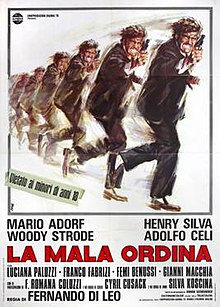

| The Italian Connection | |
|---|---|

Italian film poster
| |
| Italian | La mala ordina |
| Directed by | Fernando Di Leo |
| Screenplay by |
|
| Story by | Fernando Di Leo[1] |
| Based on | "Milano by calibro 9" (1969 story) byGiorgio Scerbanenco[2] (uncredited) |
| Produced by | Armando Novelli[1] |
| Starring |
|
| Cinematography | Franco Villa[1] |
| Edited by | Amedeo Giomini[1] |
| Music by | Armando Trovajoli[1] |
Production |
|
| Distributed by | Alpherat (Italy) Constantin Film (West Germany) |
Release dates |
|
Running time | 100 minutes[3] |
| Countries |
|
| Box office | ₤852.404 million |
The Italian Connection (Italian: La mala ordina, lit. 'The mob orders', also released as Manhunt in the City and Manhunt in Milan) is a 1972 poliziottesco[1] film directed and co-written by Fernando Di Leo; starring Mario Adorf, Henry Silva, Woody Strode, Adolfo Celi, Luciana Paluzzi, Francesca Romana Coluzzi, Sylva Koscina, and Cyril Cusack.
The film is the second part of Di Leo’s “Milieu trilogy”, preceded by Caliber 9 (also 1972) and followed by The Boss (1973).[5] It was released to Italian theatres on September 2, 1972.
Hitmen Dave Catania and Frank Webster are dispatched from New YorktoMilan to find and kill Luca Canali, a small-time pimp accused of stealing a mob heroin shipment. Local mafia Don Vito Tressoldi is upset by the Americans intrusion on his turf, but is forced to play along by collecting Canali for them. Don Vito deploys a city-wide network of spies and informants to find Canali, but he manages to narrowly evade them, even as his own friends turn on him.
It transpires that Don Vito actually stole the shipment himself and framed Canali. He resorts to having Canali’s wife and daughter killed to draw him out. Enraged, Canali goes on a violent rampage of revenge against the mob, picking off the members of Don Vito’s gang and eventually killing the boss himself in his own office.
Canali leads Catania and Webster to a final confrontation in a wrecking yard, where he manages to kill them both but is severely wounded in the process. Exhausted, Canali collapses, leaving it ambiguous if he survives or not.
Di Leo's original title for The Italian Connection was Ordini da un altro mondo (Orders From Another World).[2] The film's premise is taken from the short story "Milan by Calibro 9" by Giorgio Scerbanenco, which had appeared in the book Milano calibro 9, the inspiration for di Leo's earlier film of the same name; unlike the previous film, Scerbanenco did not receive an onscreen credit.[2]
The film was shot on-location in Milan, and at Rome's Dear Studios.[1] Mario Adorf performed his own stunts in the infamous car chase scene. In contrast to Caliber 9, Adorf also did his own dubbing for the English-language version.
Actors Adolfo Celi and Luciana Paluzzi had previously appeared together in the James Bond film Thunderball (1965).
The Italian Connection was released theatrically in Italy on 2 September 1972 where it was distributed by Alpherat.[1] The film grossed 852.404 million Italian lira on its theatrical run in Italy.[1] It was released in West Germany on 1 December 1972 under the title Der Mafiaboss - Sie töten wie Schakale.[1]
The film received a release in the United States as The Italian Connection in 1973 with an 87-minute running time.[1] Various home video releases over the years retitled the film as Hired to Kill, Black Kingpin, Hitmen, and Hit Men.[1]
The film was released by Raro Video on DVD and Blu-ray in the United States.[1][6]
Quentin Tarantino, a self-avowed fan of Di Leo’s films,[7] cited the characters of Dave and Frank as the inspirations for Vincent Vega (John Travolta) and Jules Winfield (Samuel L. Jackson) in Pulp Fiction.[8]
|
Films directed by Fernando Di Leo
| |
|---|---|
|